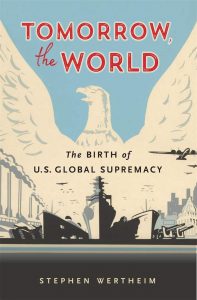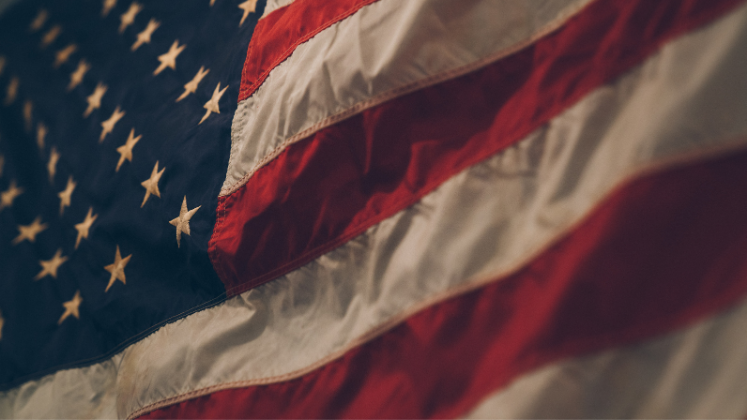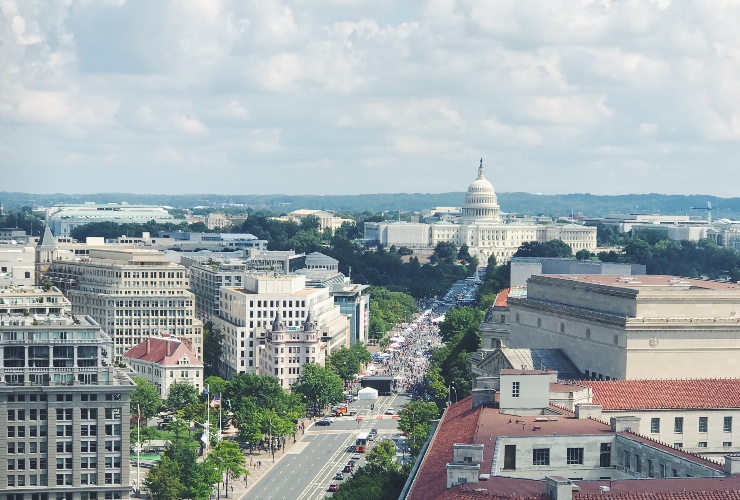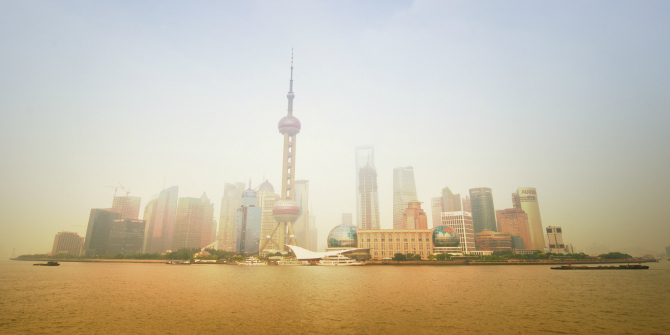In Tomorrow, the World: The Birth of U.S. Global Supremacy, Stephen Wertheim challenges the myth that the United States reluctantly acquired armed superpower status, instead focusing on World War II as a crucial period in which the US transformed its role in the international order and achieved global primacy. While unconvinced by the book’s argument that the pursuit of US primacy has been immoral and unwise, Charles Dunst nonetheless praises this admirable historical scholarship for providing an important corrective to the notion that the United States sleepwalked into a position of global supremacy.
If you are interested in this book, you can listen to author Dr Stephen Wertheim discuss its findings at the LSE book talk, ‘How the United States Decided to Dominate the World’, recorded at LSE on 20 October 2020.
Tomorrow, the World: The Birth of U.S. Global Supremacy. Stephen Wertheim. Harvard University Press. 2020.
 Find this book (affiliate link):
Find this book (affiliate link): ![]()
In classrooms across the United States, children learn from an early age that our country did not choose its current superpower status, but that the world thrust it upon us. It was circumstance — the rise of Nazi Germany and imperial Japan — that in 1941 awoke America from its isolationist slumber, forcing us into World War II; it was again circumstance — Europe’s destruction and the rise of Stalinism — that forced the United States to assume the role of liberal leviathan. Many still believe that the US ‘leadership role’ had ‘been thrust upon us by fate’, as President Gerald Ford later declared, adding: ‘Circumstances, destiny, fate, or whatever you call it […] the fact is that the United States of America is today the world’s best and perhaps its only hope of peace with freedom’.
Yet, as Stephen Wertheim — a Research Scholar at Columbia University and founder of the Quincy Institute for Responsible Statecraft think tank — shows in Tomorrow, the World: The Birth of U.S. Global Supremacy, this story is a myth. Instead, beginning in the 1930s, and particularly from 1940 to 1945, US foreign policy elites embarked on ‘a veritable reconceptualization of their nation’s world role’ to reimage the United States as ‘the premier power in the world’, a project that would culminate in America’s unquestioned post-World War II primacy.
Wertheim’s history is convincing, as he shows through the deft application of near-century-old documents that the United States did, in fact, choose supremacy. Yet his concluding argument — that such supremacy ‘has left the United States with awesome destructive power and little prospect of peace’ — is less persuasive. Like most liberal-minded critics of US global leadership, Wertheim fizzles on perhaps the most pressing front, as his critique does not grapple with the chaos that came before the US-led liberal order, the Soviet-led alternative that could have arisen had the US not claimed leadership or the current most likely analogue: China’s proposed illiberal order. US global supremacy has certainly been imperfect, and its critics are too often maligned as ‘isolationists’, as Wertheim smartly argues, but comparisons of this order with some amorphous almighty, rather than with the actual alternatives, remain doomed to fall short.
Wertheim’s historical scholarship is nonetheless admirable. He presents readers with an array of documents to show that foreign policy elites were drawing up the blueprints of a Pax Americana, an era of global peace to be insured by US dominance, before World War II even started. These elites, meanwhile, defined ‘internationalism’ as we know it today by setting themselves against ‘isolationism’, a term that achieved notoriety upon appearing in Walter Lippmann’s 23 March 1939 column in the New York Herald Tribune.

As Wertheim adeptly shows, though, ‘isolationism’ not only misrepresented the history of the supposedly insular United States — which had always engaged with the world — but delegitimised ‘isolationists’ in two ways: firstly, by signifying ‘spatial enclosure and separation’ that ‘conjured a world without international interaction and a United States confined, in every respect, to its own borders’; and secondly, by conveying a ‘regression of time’ that implied its advocates to be anachronistic. The Wall Street Journal, for its part, went as far as to identify isolationism as ‘nothing more or less than a retrogression of civilization’.
Isolationism was neither a defining characteristic of previous US foreign policy nor an apt description of those who hoped to avoid entering World War II. Yet, as Hitler’s forces marauded through Europe, American thought leaders railed against this ‘ism’ to make their case: that ‘the United States should underwrite international order by securing its own political and military supremacy’, as Wertheim notes. This argument found purchase in elite circles like those at the Council on Foreign Relations, meaning that by the time Japan attacked Pearl Harbor in 1941, the United States was primed to pursue global supremacy. ‘The attack on Pearl Harbor marked the culmination of America’s decision for dominance’, Wertheim writes, ‘but it did not initiate it’.
Washington’s decision to rule the world is thus perhaps best understood as a logical response to the catalysing events of Pearl Harbor: Americans, thanks to the designs of foreign policy elites, had global supremacy in them, but they needed to be hit hard before agreeing to take it on.
Indeed, from 1941 to 1945, the American public became more and more supportive of internationalism, and more critical of isolationism, thanks in no small part to the writings of thought leaders like Henry Luce, whose 1941 Life magazine proclamation of the coming ‘American century’ set the tone for our pursuit of global supremacy. ‘The big, important point to be made here’, he wrote, ‘is simply that the complete opportunity to leadership is ours’. These were world-historical ambitions, and ones to which the American public increasingly became accustomed. By 1945, internationalism had succeeded, with the founding of the United Nations demonstrating that the US was ‘in the world to stay’, as The New York Times put it.
The rest of the story is well-known. The United States, as part of the Allied powers, won the war; Britain, while technically also victorious, was so dilapidated that it ceded world leadership to the Americans, who, in turn, built the liberal international order we know today. It is at this point in the book, in its conclusion, that Wertheim’s argument loses a bit of steam.
From the outset of Tomorrow, the World, Wertheim aims to paint the US decision to pursue supremacy as immoral and strategically unwise. But he offers little evidence to make this point; in fact, he actually presents evidence to the alternative.
Before the United States claimed the mantle of world leadership, for instance, in 1939 strong majorities of Americans favoured a policy of ‘impartial neutrality in which the Nazis could purchase American exports’. This may have been strategically ‘wise’ for a country keen on remaining beyond Europe’s power politics, and able to do so thanks to its geography, but it is far from moral. Meanwhile, it was US President Franklin Delano Roosevelt who in 1941 — after promising that the US would fight against ‘the new order of tyranny’ — requested that Britain relinquish control of India and that France place its Indochinese colony under international trusteeship. Even in the early days of US global leadership, Washington was wielding its clout, albeit inconsistently, for profoundly liberal purposes.
Yet Wertheim decries American leaders as ‘covering the stark coercion of superior force with the veneer of liberal freedom’. There is no question that the United States secured its global supremacy through force, but to deem its commitment to freedom as nothing more than a ‘veneer’ only pages after providing evidence of Washington’s early commitment to this principle is jarring.
These episodes are indicative of the greater tension — between Wertheim’s belief in the immoral nature of US global supremacy and the evidence he presents — that undermines the book, which is otherwise a valuable historical study.
Of course, American global leadership has been far from flawless, but the liberal international order has, remarkably in the course of modern global history, prevented a war between the Great Powers. This is not an achievement that should be so easily overlooked; nor should the order be so easily denigrated. Yet Wertheim, like many other critics of the order, does not compare it with the alternatives. Perhaps this is outside of his book’s scope, but given that Wertheim portrays the liberal order so negatively — as one in which the US, ‘seeking to order the world by force […] mete[s] out continual violence, akin to policing the frontiers by empires past’ — many readers will be left expecting and then, ultimately, yearning for an explication of what better alternatives to this order might be.
Perhaps Wertheim avoids this because while the liberal order, propped up by a United States that chose global supremacy, may not be without flaws, no compelling alternative has yet been offered. It is telling that the Trump-era absence of US global leadership for much of the world prompted not glee but deep concern, comprising expressions of sadness and calls for more US leadership. It seems that former Republican presidential nominee Wendell Willkie’s 1940s argument continues to win the day: the world, as he wrote nearly eighty years ago, still ‘demands the full participation of a self-confident America’ (emphasis in original).
Regardless, with this book, Wertheim provides an important historical corrective to the notion that the United States sleepwalked into global supremacy. And while his efforts to paint this decision as unwise or immoral are less persuasive and unlikely to convince adherents of American primacy, Tomorrow, the World is nonetheless an important read for believers and non-believers alike, if only to better understand how the United States became supreme.
- This article originally appeared at the LSE Review of Books.
- Image Credit: Photo by Samuel Branch on Unsplash.
Please read our comments policy before commenting.
Note: This article gives the views of the authors, and not the position of USAPP– American Politics and Policy, nor of the London School of Economics.
Shortened URL for this post: https://bit.ly/2NjT6Zb
About the reviewer
Charles Dunst – East-West Center
Charles Dunst is a Visiting Scholar at the East-West Center in Washington, an Associate at LSE IDEAS, and a Contributing Editor of American Purpose, a new magazine founded by Francis Fukuyama and Jeff Gedmin. He has written for outlets including The New York Times, The Atlantic, The Washington Post, Foreign Policy, and the Council on Foreign Relations. He can be found on Twitter @CharlesDunst






